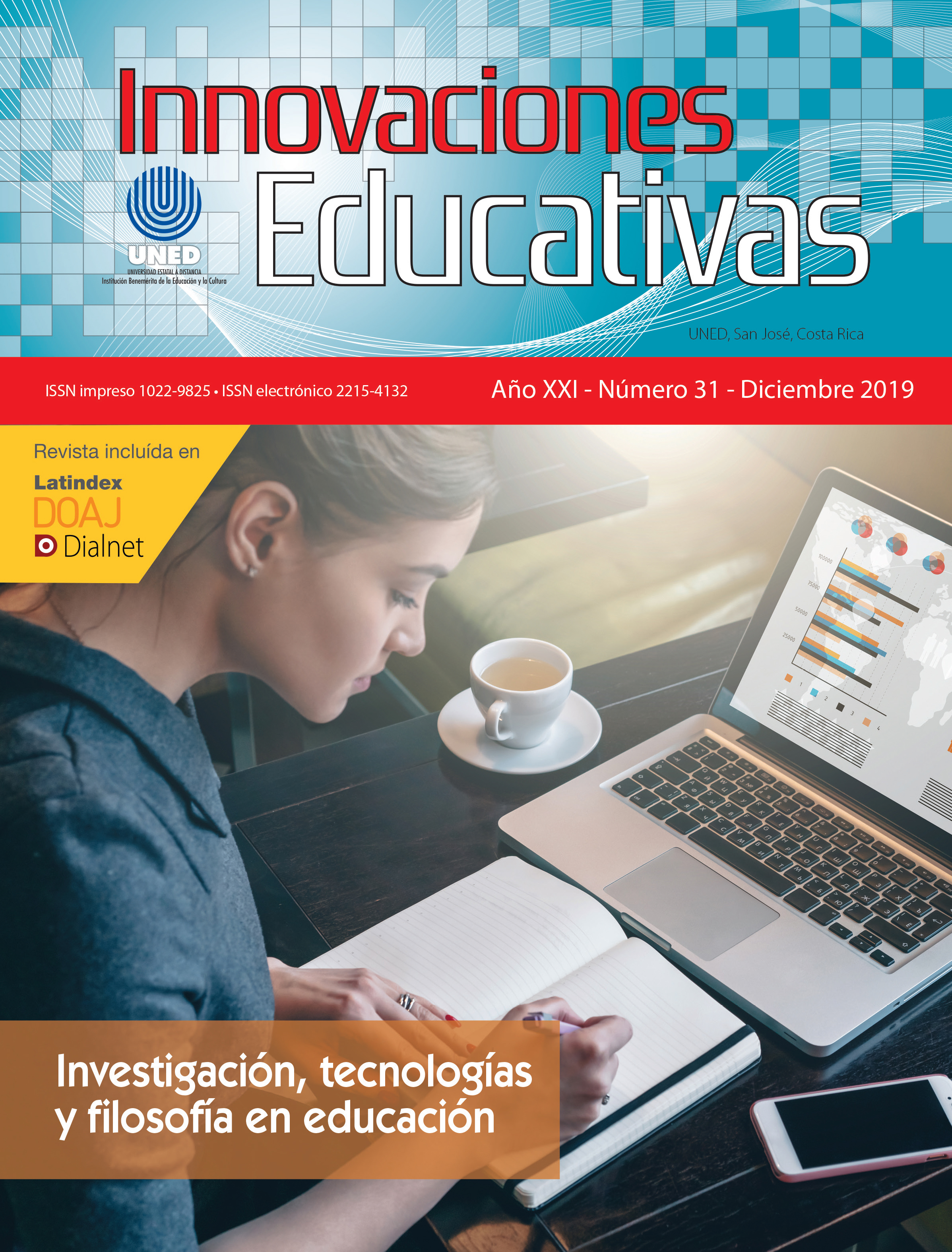Summative evaluation for solving problems in the area of Geometry
DOI:
https://doi.org/10.22458/ie.v21i31.2697Keywords:
Education, Mathematics education, Geometry, Teaching strategies, EvaluationAbstract
This article attempts to answer the following question: How to evaluate students in a summative way when they solve Geometry problems? and intends to explore the ideas of some researchers at international level who contribute inputs to an evaluation proposal in accordance with the MEP (2012). The process to achieve the above was a bibliographic investigation, through which articles with solid theoretical backing were selected that simultaneously addressed three topics: Geometry, problem solving and evaluation of learning, using similarities with the discrimination criteria theoretical foundation of the Costa Rican Mathematics programs and excluding those texts that did not offer concrete examples of their theoretical proposals. For the analysis of the information, it was organized in a deductive way, starting from the general elements of the evaluation in Mathematical Education until the proposals for specific topics of the Geometry area. Among the most outstanding findings are that the international community is conducting research in this field and has resorted to techniques such as focus group, HTE analysis, expert judgment and cognitive interview, to validate the tools generated among which are the rubrics, items of multiple selection and constructed response, on topics such as spatial visualization, decomposition and composition of figures. Among the conclusions, it is highlighted that the mathematical processes must be included in the instruments to evaluate the students’ knowledge, because they allow to approximate the competences related to Mathematics.
References
Callejo, M. (1998). Un club matemático para la diversidad. Madrid: Narcea.
Calvo, C., Deulofeu, J., Jareño, J., & Morera, L. (2016). Aprender a enseñar matemáticas en la educación secundaria obligatoria. Madrid: Editorial Síntesis.
Hunsader, P., Thompson, D., Zorin, B., Loyden, A., Zakrzewski, J., Karadeniz, I., Fisher, E. & MacDonald, G. (2014). Assessments accompanying published textbooks: the extent to which mathematical processes are evident. ZDM Mathematics Education, 46(5), 797-813. DOI 10.1007/s11858-0140570-6. Recuperado de https://link-springer-com.cidreb.uned.ac.cr/content/pdf/10.1007%2Fs11858-014-0570-6.pdf
Martinovic, D. & Manizade, A. (2018). The challenges in the assessment of knowledge for teaching geometry. ZDM Mathematics Education, 50(4), 613-629. Recuperado de https://doi.org/10.1007/ s11858-018-0934-4
Ministerio de Educación Pública. (2018). Diseño Universal para el Aprendizaje (DUA). Recuperado de http:// www.drea.co.cr/sites/default/files/Contenido/09. Folleto Diseño Univesal del Aprendizaje.pdf
Ministerio de Educación Pública. (2012). Programas de Estudio de Matemáticas. I, II y III Ciclos de la Educación General Básica y Ciclo Diversificado. San José: Ministerio de Educación Pública.
National Council of Teachers of Mathematics. (2000). Resumen Ejecutivo Principios y Estándares para la Educación Matemática. (Trad. C. Matus). Recuperado de https://docplayer.es/39947421-Resumen-ejecutivo-principios-y-estandares-para-la-educacion-matematica.html
Nortvedt, G. & Buchholtz, N. (2018). Assessment in mathematics education: responding to issues regarding methodology, policy, and equity. ZDM Mathematics Education, 50(4), 555-570. Recuperado de https://doi.org/10.1007/s11858-018-0963-z
Organización para la Cooperación y el Desarrollo Económicos. (2017). Marco de Evaluación y de Análisis de PISA para el Desarrollo : Lectura, matemáticas y ciencias, Versión preliminar, Paris: OECD Publishing. Recuperado de https://www.oecd.org/pisa/aboutpisa/ebook%20-%20PISA-D%20 FrameworkPRELIMINARY%20versionSPANISH.pdf
Prieto, G. & Delgado, A. (2003). Análisis de un test mediante el modelo de Rasch. Psicothema, 15(1), 94100. Recuperado de http://www.psicothema.com/pdf/1029.pdf
Ruiz, A. (2013). Reforma de la Educación Matemática en Costa Rica. Perspectiva de la praxis. Cuadernos de Investigación y Formación en Educación Matemática. 8(Número Especial). Recuperado de: https:// revistas.ucr.ac.cr/index.php/cifem/issue/view/1866
Ruiz, A. (2017). Evaluación y pruebas nacionales para un currículo de Matemáticas que enfatiza capacidades superiores. Cuadernos de Investigación y Formación en Educación Matemática, 12(Número Especial). Recuperado de: https://revistas.ucr.ac.cr/index.php/cifem/issue/view/2552/showToc
Ruiz, A. (2018). Evaluación y pruebas naciones para un currículo de Matemáticas que enfatiza capacidades superiores. Ciudad de México: CIAEM.
Saorín, A., Torregrosa, G. & Quesada H. (2018). Razonamiento Configural Extendido: coordinaciónde procesos cognitivos en la resolución de problemas geométricos empíricos. Memorias del II Congreso de Educación Matemática de América Central y El Caribe. Recuperado de http://ciaem-redumate.org/ cemacyc/index.php/iicemacyc/iicemacyc/paper/viewFile/72/88
Santos, L. (2007). La resolución de problemas matemáticos. Fundamentos cognitivos. México: Editorial Trillas.
Smith-Castro, V. & Molina, M. (2011). La entrevista cognitiva: Guía para su aplicación en la evaluación y mejoramiento de instrumentos de papel y lápiz. Serie de Cuadernos Metodológicos, Cuaderno 5. Recuperado de http://www.iip.ucr.ac.cr/sites/default/files/contenido/cuamet5.pdf
Yang, K. & Li, J. (2018). A Framework for Assessing Reading Comprehension of Geometric Construction Texts. International Journal of Science and Mathematics Education, 16(1), 109-124. Recuperado de https://doi.org/10.1007/s10763-016-9770-6
Zumbado, M., Sánchez, A., Mora, M. & Salas, B. (2018). Propuesta de evaluación de los aprendizajes en un currículo que involucra la resolución de problemas como estrategia metodológica (Reporte de investigación inédito). San José: Cátedra de Didáctica de la Matemática, UNED.









